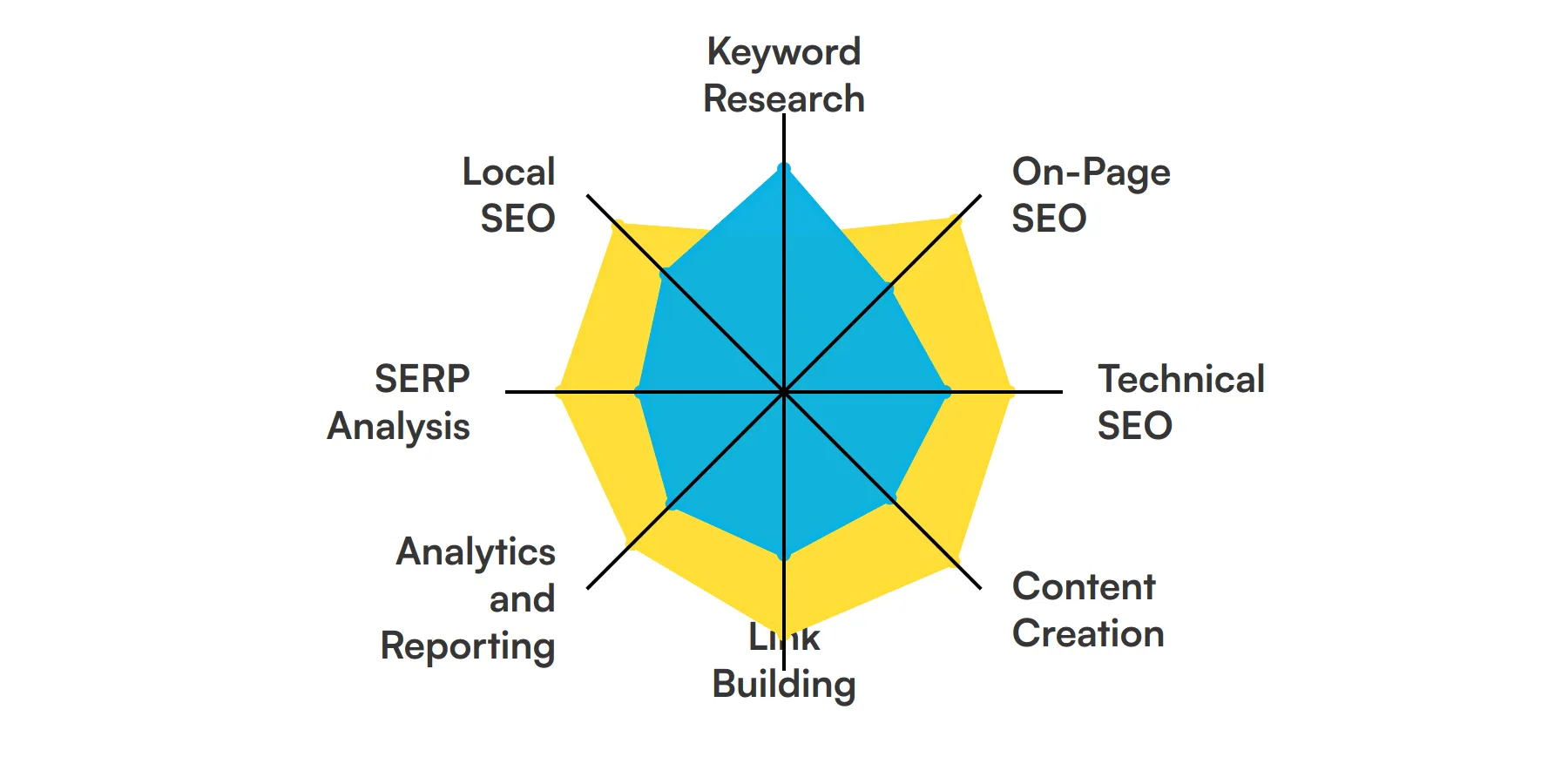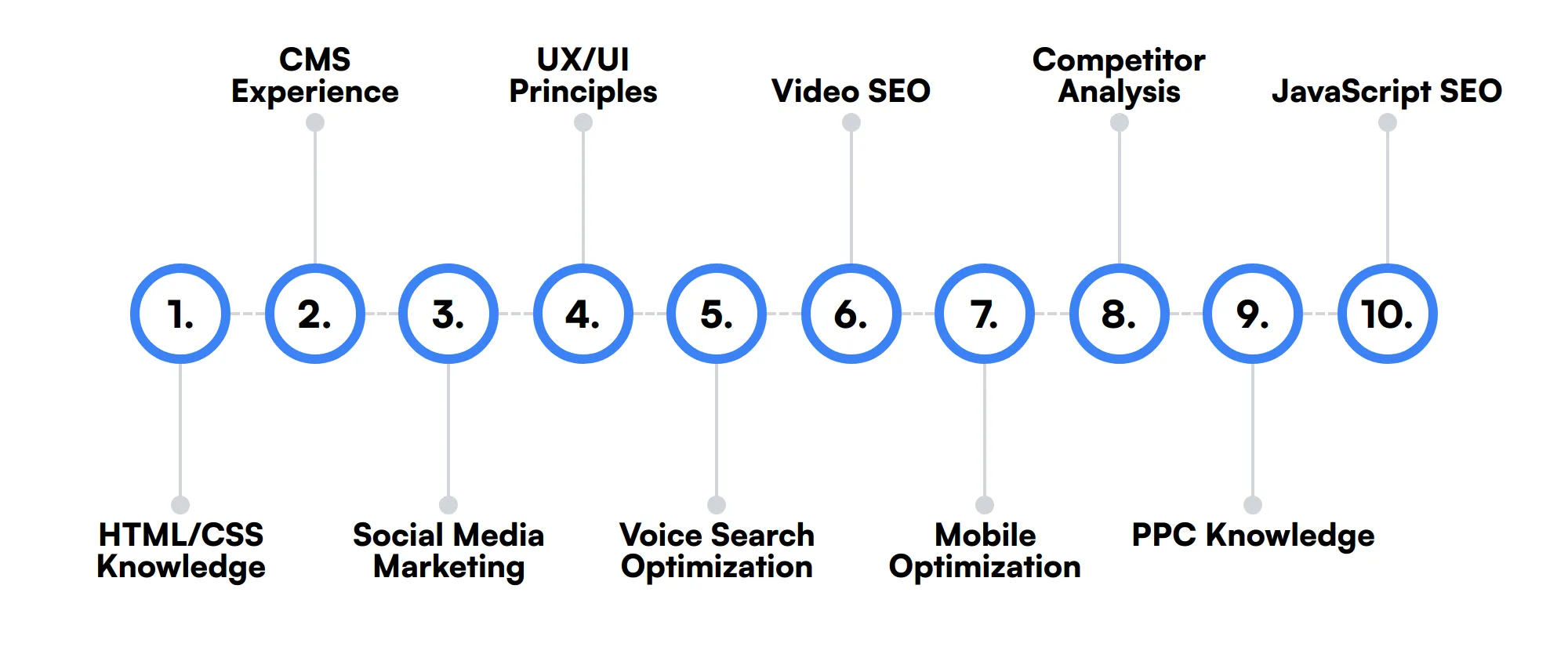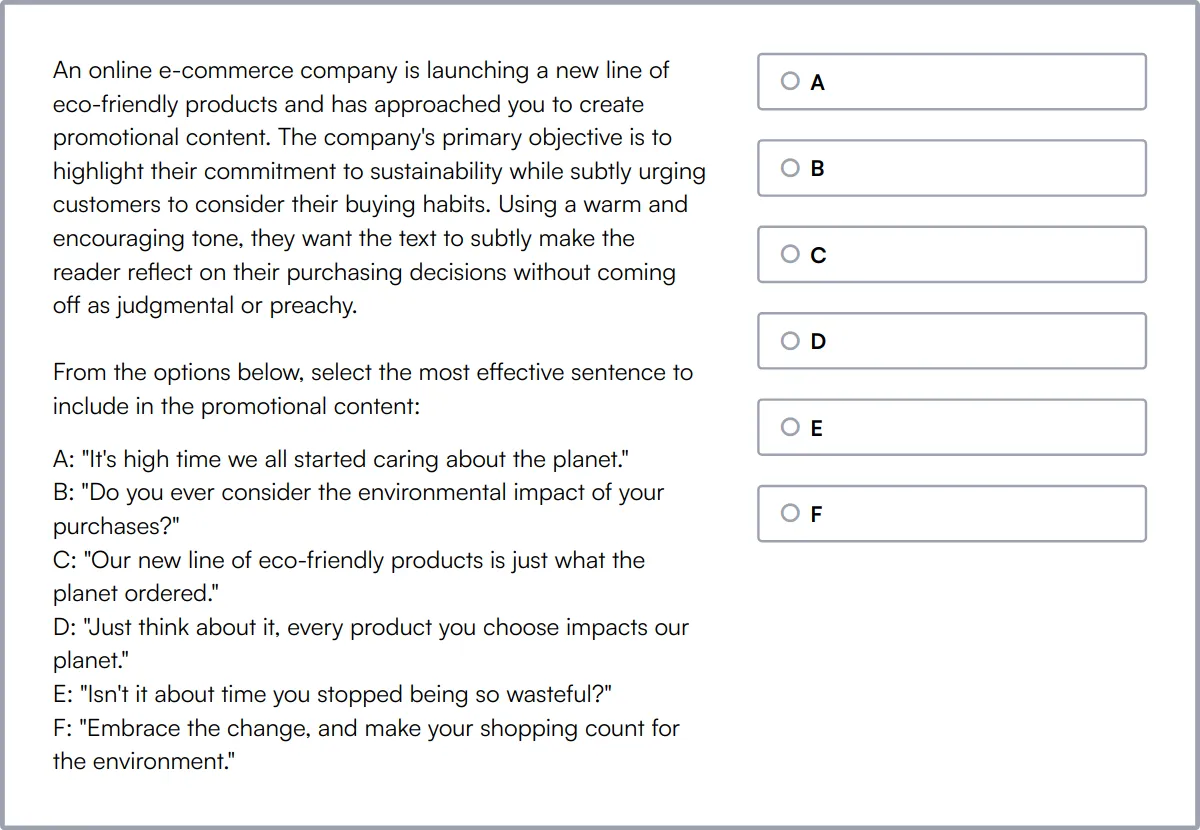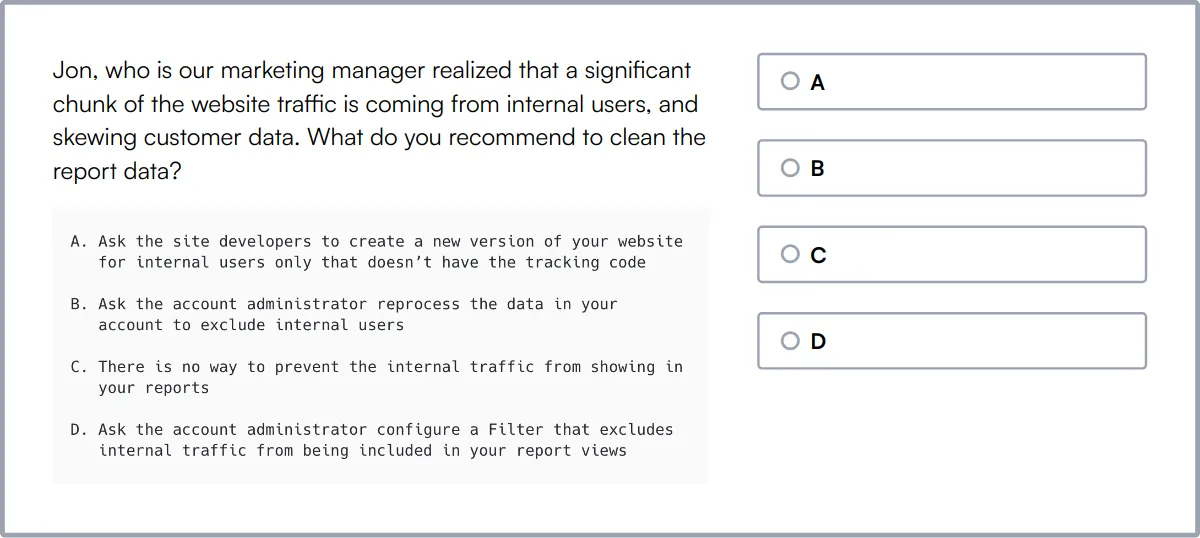SEO specialists play a key role in enhancing the visibility and ranking of websites on search engines. They use various techniques and strategies to ensure that a website appears prominently in search results, driving organic traffic and increasing online presence.
SEO skills encompass a range of abilities, including keyword research, on-page and off-page optimization, and understanding of search engine algorithms. Additionally, skills like analytical thinking and adaptability are crucial for staying ahead in the ever-evolving landscape of search engine optimization.
Candidates can write these abilities in their resumes, but you can’t verify them without on-the-job SEO Specialist skill tests.
In this post, we will explore 8 essential SEO Specialist skills, 10 secondary skills and how to assess them so you can make informed hiring decisions.
Table of contents
8 fundamental SEO Specialist skills and traits
The best skills for SEO Specialists include Keyword Research, On-Page SEO, Technical SEO, Content Creation, Link Building, Analytics and Reporting, SERP Analysis and Local SEO.
Let’s dive into the details by examining the 8 essential skills of a SEO Specialist.

Keyword Research
Keyword research is the backbone of SEO strategy, enabling SEO specialists to identify and target phrases that potential customers are searching for. This skill involves using tools like Google Keyword Planner to analyze search volume and competition, ensuring content is optimized to increase visibility and traffic.
Check out our guide for a comprehensive list of interview questions.
On-Page SEO
On-page SEO involves optimizing web page content for search engines and users. Common tasks include optimizing title tags, headers, and images, as well as ensuring that the content includes relevant keywords. This skill helps improve the site's readability by search engines and can significantly boost page rankings.
Technical SEO
Technical SEO focuses on improving the technical aspects of a website to enhance its ranking in search engines. This includes site speed optimization, mobile-friendliness, and structured data implementation. An SEO specialist uses this skill to ensure the website meets the technical requirements of modern search engines.
For more insights, check out our guide to writing a SEO Specialist Job Description.
Content Creation
Content creation is crucial for SEO as it involves crafting valuable content that meets the needs of users and includes targeted keywords. SEO specialists work closely with content creators to ensure that all content is SEO-friendly, engaging, and capable of driving organic traffic.
Link Building
Link building is the process of acquiring hyperlinks from other websites to your own. A skillful SEO specialist uses strategic outreach and content marketing to earn backlinks that positively influence the site's authority and ranking in search engines.
Analytics and Reporting
Analytics and reporting are key to understanding the success of SEO efforts. Using tools like Google Analytics, SEO specialists track metrics such as traffic, bounce rates, and conversions, allowing them to refine strategies and report ROI effectively.
Check out our guide for a comprehensive list of interview questions.
SERP Analysis
Search Engine Results Page (SERP) analysis helps SEO specialists understand the current landscape of search results for specific queries. This skill involves assessing competitor rankings and identifying opportunities to improve or create content that can outperform others.
Local SEO
Local SEO optimizes a website to be found in local search results. This includes managing local listings and optimizing for local-specific keywords. SEO specialists use this skill to target geographical customer bases and improve visibility in local search queries.
10 secondary SEO Specialist skills and traits
The best skills for SEO Specialists include HTML/CSS Knowledge, CMS Experience, Social Media Marketing, UX/UI Principles, Voice Search Optimization, Video SEO, Mobile Optimization, Competitor Analysis, PPC Knowledge and JavaScript SEO.
Let’s dive into the details by examining the 10 secondary skills of a SEO Specialist.

HTML/CSS Knowledge
Understanding HTML and CSS is beneficial for SEO specialists as it allows them to make minor website adjustments that can improve SEO performance without always needing a developer.
CMS Experience
Experience with Content Management Systems (CMS) like WordPress or Joomla enables SEO specialists to implement changes directly and efficiently, speeding up the optimization process.
Social Media Marketing
While not directly SEO, social media marketing can complement SEO strategies by increasing content visibility and generating backlinks, thus indirectly boosting SEO results.
UX/UI Principles
Understanding user experience (UX) and user interface (UI) design principles helps SEO specialists ensure that a website is not only optimized for search engines but also provides a pleasant user experience.
Voice Search Optimization
As voice search becomes more popular, optimizing for voice search queries is becoming an increasingly useful skill for SEO specialists looking to future-proof their strategies.
Video SEO
Video content can significantly enhance SEO efforts. SEO specialists with skills in video SEO can optimize video content and descriptions to improve visibility on video platforms like YouTube.
Mobile Optimization
With the increasing prevalence of mobile devices, mobile optimization skills are necessary to ensure websites perform well on smartphones and tablets, affecting overall SEO performance.
Competitor Analysis
Competitor analysis involves identifying and evaluating the SEO strategies of competitors. This insight helps SEO specialists develop tactics to compete more effectively in the market.
PPC Knowledge
Knowledge of Pay-Per-Click (PPC) advertising can aid SEO specialists in understanding how paid and organic search efforts can complement each other for better overall search strategy.
JavaScript SEO
As websites become more dynamic, understanding JavaScript and its impact on SEO is beneficial for specialists to ensure search engines can properly crawl and index JavaScript-heavy sites.
How to assess SEO Specialist skills and traits
Assessing the skills and traits of an SEO Specialist can be a challenging task. With a wide range of responsibilities, from keyword research to local SEO, it's important to have a clear understanding of what to look for in a candidate. Resumes and certifications can only tell you so much; they don't provide a complete picture of a candidate's practical abilities and fit for your specific needs.
To truly gauge an SEO Specialist's capabilities, skills-based hiring practices are essential. This includes evaluating their proficiency in key areas such as on-page SEO, technical SEO, content creation, and link building. One effective way to do this is through talent assessments. Adaface on-the-job skill tests can help you achieve a 2x improved quality of hires and an 85% reduction in screening time.
By leveraging these assessments, you can ensure that your candidates not only have the theoretical knowledge but also the practical skills required to excel in their role. This approach allows you to make more informed hiring decisions, ultimately leading to better performance and results for your SEO efforts.
Let’s look at how to assess SEO Specialist skills with these 3 talent assessments.
PPC Assessment Test
Our PPC Assessment Test evaluates candidates on their proficiency in pay-per-click advertising, covering everything from keyword research to campaign performance analysis.
The test assesses their understanding of digital marketing strategies, including ad copywriting, bid management, and conversion tracking.
Successful candidates demonstrate a strong ability to manage budgets, optimize campaigns, and analyze market data to enhance advertising effectiveness.
Copywriting Skills Test
The Copywriting Skills Test measures a candidate's command over the English language and their ability to produce compelling copy across various formats.
This test evaluates grammar, vocabulary, and attention to detail, along with the ability to understand audience needs and craft messages accordingly.
High-scoring candidates will show proficiency in creating engaging headlines, effective calls to action, and writing that resonates with different audience segments.

Google Analytics Test
Our Google Analytics Test assesses a candidate's ability to leverage the Google Analytics platform to extract and analyze data for business decisions.
The test covers setting up tracking, creating customized reports, and analyzing user behavior to optimize marketing campaigns.
Candidates who excel in this test can effectively implement e-commerce tracking and use advanced analytics techniques to drive targeted traffic and conversions.

Summary: The 8 key SEO Specialist skills and how to test for them
| SEO Specialist skill | How to assess them |
|---|---|
| 1. Keyword Research | Evaluate the ability to identify high-traffic, relevant keywords. |
| 2. On-Page SEO | Check proficiency in optimizing individual web pages for search engines. |
| 3. Technical SEO | Assess skills in improving website backend and server performance. |
| 4. Content Creation | Review the capability to produce engaging, SEO-friendly content. |
| 5. Link Building | Measure effectiveness in acquiring high-quality backlinks. |
| 6. Analytics and Reporting | Gauge proficiency in interpreting and presenting SEO data. |
| 7. SERP Analysis | Evaluate skills in analyzing search engine results pages. |
| 8. Local SEO | Check expertise in optimizing for local search results. |
SEO Online Test
SEO Specialist skills FAQs
What is the importance of keyword research in SEO?
Keyword research helps identify the terms and phrases your target audience is searching for. This guides content creation and optimization efforts to improve search engine rankings.
How can you assess an SEO specialist's technical SEO skills?
Ask them to perform a site audit and identify issues like broken links, crawl errors, and site speed. Review their ability to use tools like Google Search Console and Screaming Frog.
What tools are commonly used for on-page SEO?
Tools like Yoast SEO, SEMrush, and Ahrefs are commonly used to optimize meta tags, headers, and content for better search engine visibility.
Why is content creation important for SEO?
High-quality content attracts and engages users, encouraging them to spend more time on your site. It also helps in earning backlinks and improving search engine rankings.
How do you evaluate an SEO specialist's link-building skills?
Review their past link-building strategies and results. Ask for examples of high-quality backlinks they have secured and their approach to outreach.
What is the role of analytics and reporting in SEO?
Analytics and reporting help track the performance of SEO efforts. Tools like Google Analytics and Google Data Studio are used to measure traffic, conversions, and other key metrics.
How does local SEO differ from general SEO?
Local SEO focuses on optimizing a website to rank better for local searches. This includes managing Google My Business profiles, local citations, and reviews.
What is the significance of mobile optimization in SEO?
With the increasing use of mobile devices, search engines prioritize mobile-friendly websites. Mobile optimization ensures a better user experience and higher search rankings.
Assess and hire the best SEO Specialists with Adaface
Assessing and finding the best SEO Specialist is quick and easy when you use talent assessments. You can check out our product tour, sign up for our free plan to see talent assessments in action or view the demo here:

40 min skill tests.
No trick questions.
Accurate shortlisting.
We make it easy for you to find the best candidates in your pipeline with a 40 min skills test.
Try for freeRelated posts
Free resources



